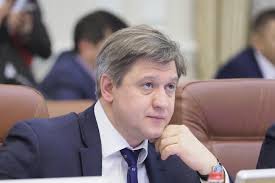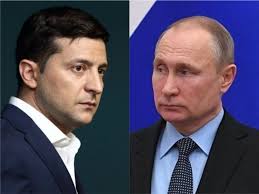
Secretary of the National Security and Defense Council of Ukraine (NSDC) Oleksandr Danyliuk, financial policy expert and newly elected MP from the Servant of the People Party Danylo Getmantsev, Deputy Head of the President’s Office Ruslan Riaboshapka and Head of the State Tax Service Serhiy Verlanov will meet with representatives of the European Business Association (EBA) regarding setting up the Financial Investigations Service.
According to the EBA, during the discussion the issues of the draft law on the Financial Investigations Service, its structure, subordination, approaches to work and instruments will be raised.
The event will take place at the InterContinental Kyiv hotel at 09:00 on August 22.

President of Ukraine Volodymyr Zelensky has said that it is impossible to understand the executions of Jews, Ukrainians, Roma and other victims of Babyn Yar, to forget and forgive this crime, and its repetition cannot be allowed.
“It is impossible to understand the inhuman desire to destroy people on ethnic, national or political grounds, regardless of gender and age. Before our eyes there is a terrible endless queue of people who did not understand that they were being led to death,” he said, speaking on Monday at a ceremony of reverence to victims of Babyn Yar with Israeli Prime Minister Benjamin Netanyahu.
Zelensky noted that most of those killed in Babyn Yar were of Jewish nationality, but “having shot all the Jews they could find, the Nazis began to get rid of other prisoners: Roma, Ukrainians who were fighting for their state.”
“The totalitarian Soviet regime tabooed such topics as the Holocaust, Babyn Yar, the Holodomor, and hid the real scale of these crimes,” he said.
Zelensky noted that, according to various sources, during the period of the Nazi occupation from 70,000 to 200,000 people were shot in Babyn Yar.
“It is impossible to forget and forgive, and the Ukrainian people will always remember these crimes against humanity. We will never forget what xenophobia and racism lead to. The ideology of intolerance and violence deprives of the most precious and valuable thing – human life,” said the president of Ukraine.
Zelensky called on the international community to join forces to prevent manifestations of anti-Semitism and intolerance on racial or national grounds.
“We must not allow it again! Eternal memory to the victims of the Babyn Yar, eternal memory to the victims of the Second World War,” said the president of Ukraine.

There are no specific plans for a possible meeting between the presidents of Russia and Ukraine, Vladimir Putin and Volodymyr Zelensky, as of yet, Kremlin spokesman Dmitry Peskov told the press on Tuesday. “There are more questions than answers. There are no plans concerning a possible meeting with President Zelensky as of yet,” Peskov said.

It is possible to lower electricity prices for non-domestic consumers by 20%, presidential representative in the government Andriy Gerus said.
“It is necessary to consider three solutions that all together are to significantly reduce the price of electricity for non-domestic consumers,” he said at a briefing following the results of the conference with President of Ukraine Volodymyr Zelensky over functioning of a new model of electricity market and preparation for autumn-winter period in Kyiv on Monday.
According to him, it is necessary to review government’s resolution on charging National Nuclear Energy Generating Company Energoatom and PrJSC Ukrhydroenergo with the special duties, most of which to be commissioned to the latter.
“It will allow decreasing tariff of Ukrhydroenergo over three times. Now it is 32 kopecks/kWh, when it is expected to be 8-9 kopecks/kWh,” Gerus said.
Besides, he said that it was worth to raise a maximum night price by about 10%, and to lower a maximum day price by 15-20%.
“If all three measures are taken, [electricity price] for ending consumers, large, middle, small, budget establishments and organizations, will be almost 20% less,” the presidential representative said.

The President of Ukraine was informed of an extremely unpleasant incident in Uman, the Hasidic pilgrimage center, in which the city authorities were involved.
This was stated by the founder and head of the Orthodox Jewish Chamber of Commerce (New York), Duvi Honig.
“The Chamber of Commerce of Orthodox Jews sent a delegation here to call on President Zelensky to stop corruption in Uman, where land is being taken away from Jews. The local mayor and his deputy are demanding huge bribes in exchange for permission to build a memorial complex that includes a twenty-thousand-seat synagogue to accommodate everyone who comes to the city to meet Rosh Hashanah (Jewish New Year – Ed.) They demand 300 thousand dollars into their own pockets. We have all the documents, but they want to change the zoning and make a park on the land unless they receive these dollars. Today we met with President Zelensky after we had passed this information onto him two days ago, and the president said that he would personally deal with this matter. We are now sending him all the documents, but he has already sent a delegation from the President’s Office to Uman to deal with the situation on the spot, and this has already been done,” he said.
“We thank President Zelensky for his quick response and leadership. We were pleased to meet with him and we will help the people of Ukraine, the people of Kyiv and Uman, become a modern nation, rather than a third world country. People who come to Uman from the United States, Canada, Israel, Europe should live in normal conditions, have a normal spiritual center, because currently there is no proper infrastructure. And, of course, the mayor and his deputy must leave their posts. They must understand that it is impossible to blackmail and sabotage and use own society as a piggy bank,” Duvi Honig said.
Recall that for more than 10 years the Jewish religious community of Bratslav Hasidim has been fighting for the right to build a Jewish memorial complex in Uman – one of the largest Jewish spiritual centers in Ukraine.
The head of the orthodox Jewish Chamber of Commerce is Mr. Duvi Honig.
CORRUPTION, JCC, SCANDAL, UMAN

The Vodafone Ukraine mobile communications in April-June 2019 saw UAH 3.8 billion in revenue, which is 20.7% more than a year ago.
According to the financial report of the operator, its net profit for the period remained at the level of 2018 and amounted to UAH 511 million.
Operating Income Before Depreciation and Amortization (OIBDA) increased 13.8% and reached UAH 2 billion, OIBDA margin amounted to 51.7% (54.9% in the second quarter of 2018).
“The main reason for Vodafone’s revenue growth was the increase in the number of data users and the consumption of data services. The traffic volumes are growing due to the activity of 4G users: for example, the 4G client Vodafone used 7.7 gigabytes of traffic per month on average. This is twice as much than 3G clients use. The total volume of Internet traffic in the Vodafone network has doubled over the year,” the operator said in the report.
At the same time, the company said that according to the results of April-June, Vodafone Ukraine had the lowest ARPU (average revenue per user per month) in the market – UAH 61.
Income from trading activities in the second quarter increased thanks to the expansion of own retail. “Today Vodafone Retail is one of the largest retailers in the country. The company’s trading network today has about 240 own stores. Vodafone stores offer only certified products: smartphones, various gadgets, wearable electronics, routers, accessories. You can also connect any Vodafone services in the stores and get qualified advice from the company’s experts,” the company said in the press release devoted to the financial statements of the company.
In addition, according to the results of April-June, the number of Ukrainian settlements covered by 4G increased four times. Today, Vodafone network is available to 62% of Ukrainians and covers more than 4,000 settlements.
According to the results of the second quarter, the number of Vodafone Ukraine customers amounted to 19.6 million, while according to the results of the second quarter of last year, the operator had 20.3 million customers in Ukraine.
“Among the growth factors, launch of mobile number portability service in Ukraine can be noted. In May-June, 3,657 customers used the service to go to the Vodafone network with their number,” the company said.